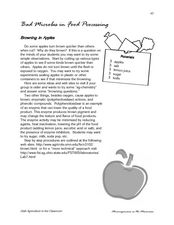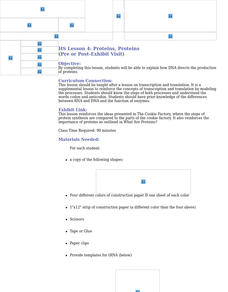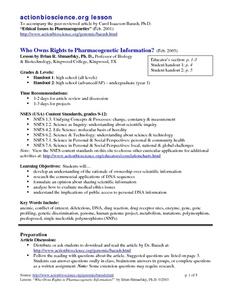Curated OER
Bad Microbes in Food Processing
Students complete an experiment to determine if there are bad microbes in food processing.In this bad microbe experiment, students use apples to see how they react to oxygen. Students test apples with chemicals to observe the changes.
Curated OER
Nucleic Acid
In this chromosome worksheet students complete a crossword puzzle by answering questions on DNA, nucleic acids, nucleotides and RNA.
Curated OER
How Is the Genetic Code Ultimately Translated Into a Protein?
Students examine the functions of mRNA, rRNA and tRNA. They explain the steps in the protein synthesis process. They practice using new vocabulary as well.
Curated OER
Macro-DNA: Doing DNA Fingerprinting and Gel Electrophoresis
Students create numbered DNA sequences by taping together the order of the sequence. They count the number of bases in their RFLP's and shade the boxes on their Gel Electrophoresis sheets that represent individual fragments. They...
Curated OER
Saliva Lab
In this saliva worksheet, high schoolers conduct an experiment to test how saliva breaks down starches. Students complete 6 short answer questions.
Curated OER
Digestive System Quiz
In this digestive system worksheet, high schoolers answer 9 questions, 2 of which are multiple choice and 7 are short answer. Included are questions about the process of digestion and the structures of the digestive system.
Curated OER
SAY IT WITH DNA: Protein Synthesis Tutorial
Ninth graders explore protein synthesis. In this DNA lesson students complete a worksheet and a DNA lab activity.
Curated OER
How Genes Work Lesson Plan
Students define the key terms that are the structure and function of DNA. In this genetics lesson students complete a lab activity in which they construct a model DNA structure.
Curated OER
Genome: The Secret of How Life Works
Students explain how DNA directs the production of proteins.
Curated OER
From One End to the Other
Seventh graders become more familiar with how our food is broken down mechanically and chemically. They also trace the food through the alimentary canal.
Curated OER
The Digestive System: An Overview
Students label main structures of the digestive system, describe each structure's function, and describe sequence of events involved in digestion.
Curated OER
Transcription, Translation, and the Genetics of Microbes
Students construct various virus models using Fruit loops and Alphabits to represent nucleotides and molecules. They constructs capsomeres using shoes as the capsomeres and discuss various viruses.
Curated OER
DNA and Individual Differences
Middle schoolers list differences between DNA-related terms and create a simple DNA circle map. They order terms including human body, organ, tissue, cell, nucleus, etc. from largest to smallest. They discuss differences and...
Curated OER
Construction of a Hemoglobin Gene
Students see how eight pairs of triplets are equivalent to part of a gene and control a part of heredity. They comprehend how blood corpuscles manufacture normal hemoglobin. Students already comprehend that genes control the synthesis...
Curated OER
Cells Study Questions and Definition
In this cells worksheet, students define 14 words associated with cells. They answer 12 short answer questions about the structure and function of the cellular system.
Curated OER
DNA Vocabulary Review
In this DNA worksheet, students review vocabulary words associated with DNA, DNA replication, and gene expression. This worksheet has 13 matching questions.
Curated OER
Biotechnology
Students explore biotechnology through various activities. For this biology lesson, students analyze its pros and cons. They study and read informative articles about biotechnology.
Curated OER
Who Owns Rights to Pharmacogenetic Information?
Young scholars develop an understanding of the rationale of ownership over scientific information. They research commercial applications of DNA sequences. They analyze how to evaluate medical ethics issues.
Curated OER
DNA Fingerprinting: You Be the Judge!
Learners use their knowledge of DNA fingerprinting to evaluate the use fingerprints in courts, and will address the ethics of establishing a national database of fingerprints.
Curated OER
"Who Done It?" Analysis of Molecular Fingerprints Left At the Scene of the Crime
Students examine different types of DNA fragments. They record and analyze their results. They determine who is the criminal in the story.
Curated OER
DNA Fingerprinting: You Be the Judge!
Learners explore DNA fingerprinting. Students discover how DNA fingerprinting is done and judge the validity. They evaluate the use of certain prints in courts and address the ethics of establishing a national database of fingerprpints.
Curated OER
DNA replication
Students write an essay on the basic steps of the DNA replication process accurately enough to show a complete understanding of the subject. Finally, student correctly identify the polarity of the template strand and match the correct...
Curated OER
Microbe Experimentation: Sour Milk
Sixth graders design and conduct an experiment with milk to investigate how temperature affects bacteria growth. They, in groups, construct a hypothesis, perform the experiment and then record and present the results.
Curated OER
Determination of the Physical Properties of Dietary Fibers
In this dietary fibers worksheet, students compare and contrast the properties of different fibers: cellulose, hemicellulose, pectin, guar, agar, and xanthan gum. This worksheet has 5 short answer questions.

























